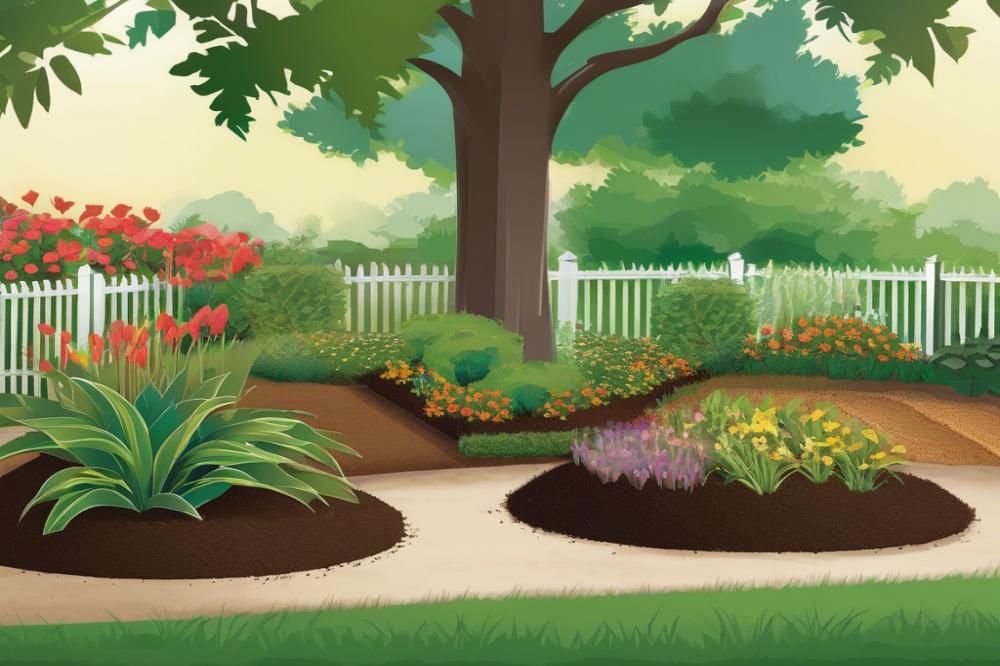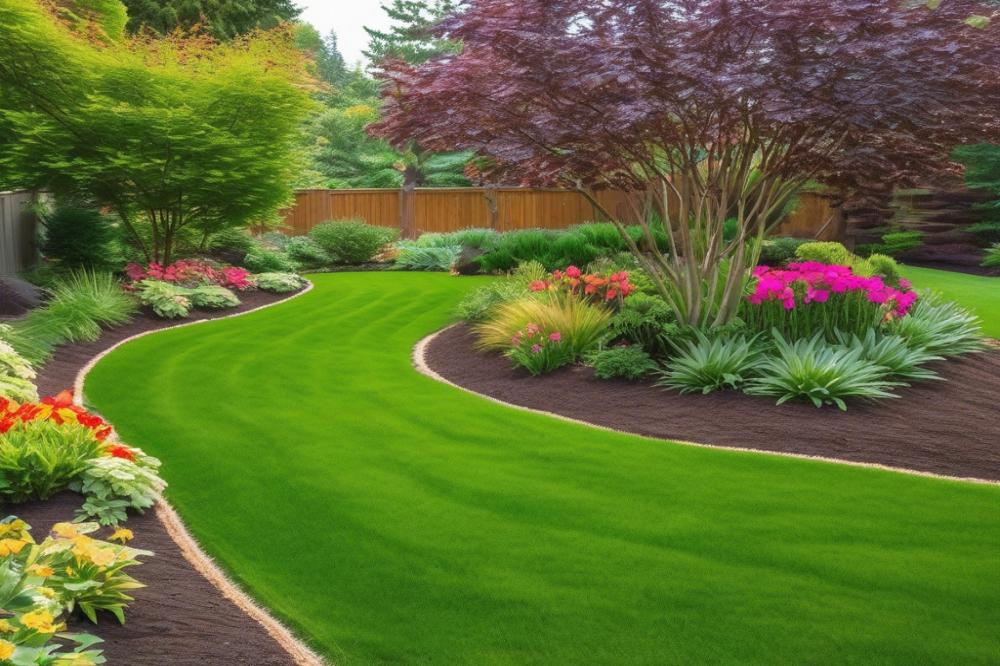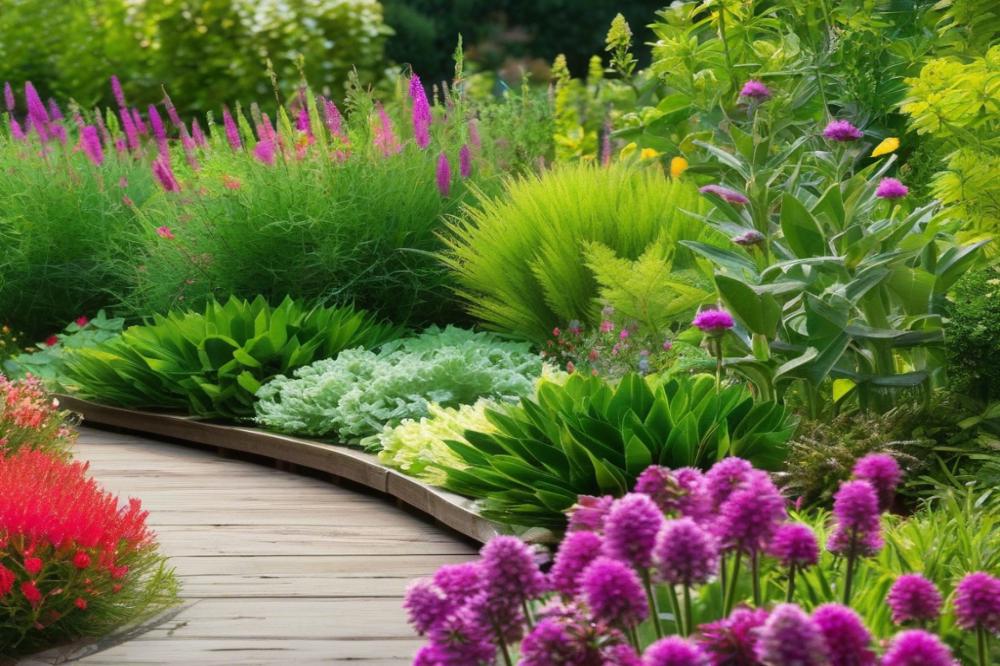The Benefits of mulching for pest control
Natural pest control is crucial for any successful garden. Many gardeners seek methods that do not rely on harsh chemicals. This approach not only protects plants but also promotes a healthier ecosystem. Among the various techniques available, mulching stands out as a particularly effective practice.
One of the primary benefits of using organic matter around plants is the significant weed suppression it offers. Weeds compete with garden plants for vital resources, such as nutrients and water. By preventing weed growth, gardens can maintain better overall plant health. Furthermore, a well-chosen layer of mulch aids in retaining soil moisture, which is essential during dry spells.
Temperature regulation is another important aspect of mulching. A good layer of organic material can cool the soil in hot weather while warming it during cooler months. This temperature control helps create a more stable environment for plants, allowing them to thrive.
Beyond these advantages, mulching contributes positively by attracting beneficial insects to the garden. These helpful creatures play a role in pest control, managing harmful insect populations without the need for synthetic pesticides. Additionally, various mulch types offer different benefits. For instance, wood chips break down over time, improving soil fertility and adding nutrients back into the ground.
Regular garden maintenance can be simplified through the use of this practice. Mulch reduces the amount of time spent weeding and watering. By creating a sustainable gardening environment, gardeners can enjoy flourishing plants while reducing their carbon footprint. In conclusion, incorporating mulching into your gardening routine not only helps with pest management but also boosts the overall health and vitality of your garden.
Mulching and Pest Control


Applying a layer of material to the surface of soil can effectively deter pests and create a healthier environment for plants. This practice plays a vital role in weed suppression, which helps limit spaces where harmful insects can breed. A well-maintained garden that focuses on proper management often faces fewer pest issues.
Different types of organic matter, such as wood chips or straw, add nutrients to the soil as they decompose. When organisms break down this matter, they improve soil fertility, leading to stronger and more resilient plants. Healthier plants can better withstand pest pressures, reducing the need for chemical pesticides.
In addition to enhancing plant health, a good layer of cover helps retain soil moisture. Keeping the soil damp provides an inviting habitat for beneficial insects, which prey on pests. Ladybugs, for example, can thrive in mulched areas, and they help control aphid populations.
Temperature regulation is another advantage of using this technique. Soil within a mulch-covered garden tends to maintain a more consistent temperature. Extreme heat and cold can stress plants, making them more vulnerable to infestations.
Pests often seek out dark, damp places to hide, and the right cover can minimize these habitats. By creating a less favorable environment for them, gardeners promote sustainable gardening practices. This proactive measure also aids in general garden maintenance, lowering the chances of pest outbreaks over time.
With the right approach, choosing the correct mulch types can support an eco-friendly ecosystem. Every layer benefits the overall garden, while discouraging pest populations. Each steps towards building a balanced environment positive for plant life.
Weed Suppression and Its Role in Pest Management


A thick layer of mulch serves as a formidable barrier against weeds. By blocking sunlight, it hinders seed germination and growth. This weed suppression is crucial because weeds often compete with garden plants for essential resources. When plants are stressed by competition, their health may decline, making them more susceptible to pests.
Different types of mulch can be used in gardens. Organic options, like wood chips or straw, gradually decompose, enriching the soil with organic matter. This improves soil fertility and promotes better plant health. Additionally, mulch helps retain soil moisture, which is vital for plant growth, especially during hot weather.
Cooler soil temperatures are another benefit of a good mulch layer. When the soil temperature remains stable, plants can thrive more effectively. Healthy plants are less likely to attract pests, thus reducing the need for chemical pest control.
Furthermore, healthy ecosystems encourage beneficial insects, which naturally suppress pest populations. Ladybugs and lacewings, for example, prey on many common garden pests. Their presence indicates a balanced garden where mulching plays a significant role.
Effective garden maintenance involves regularly checking for weeds, but a good mulch layer minimizes the amount of work needed. It reduces the gardener’s need to use harmful chemicals, supporting sustainable gardening practices. In the long run, an effective mulching strategy creates a thriving environment for both plants and beneficial organisms. This interplay of factors showcases how weed suppression contributes to a healthier garden ecosystem.
Soil Moisture Retention and Its Impact


Maintaining soil moisture is crucial for the health of plants. When a layer of material covers the ground, it reduces evaporation. This helps keep the soil moist for longer periods. Different mulch types, such as wood chips or straw, can trap moisture effectively. They create a barrier against the sun’s intense heat, which helps regulate temperature as well.
Healthy plants are less vulnerable to pests. With sufficient moisture, they grow stronger and are more resilient. Plants that droop due to lack of water can attract harmful insects. A well-hydrated garden helps nurture beneficial insects, which contribute to a balanced ecosystem. These insects may even prey on undesirable pests, naturally controlling their population.
Organic matter from decomposition in mulch adds nutrients to the soil. This process enhances soil fertility and boosts overall plant health. As nutrients are absorbed, the vital energy of plants increases. This makes them robust enough to withstand pest attacks more effectively.
Moreover, weed suppression is another important advantage. Weeds often compete with garden plants for moisture and nutrients. By covering the soil, mulching reduces the growth of these competitors. Less weed growth means more resources for the desirable plants. Therefore, healthy, thriving plants can produce better yields and resist pests more efficiently.
In sustainable gardening practices, moisture management plays a role. When gardens receive adequate water, plants exhibit better growth patterns. They become sturdy and can defend themselves against various pest threats. Garden maintenance becomes easier, too, as the staff spends less time watering and dealing with weed problems. All these factors combined create an environment that supports healthy plants and reduces pest-related issues.
Building Organic Matter for Soil Fertility


Organic mulches play an important role in enhancing soil fertility. As they decompose, these materials break down into rich organic matter. This process adds essential nutrients back into the earth, creating a thriving environment for plant health. Nutrients like nitrogen, phosphorus, and potassium are released during decomposition, which supports vigorous plant growth.
Plants that grow robustly are often better equipped to withstand pests and diseases. When plants are healthy, they can resist attacks from unwanted insects. This is because strong plants have thicker cell walls and more efficient defense mechanisms. In turn, healthy vegetation can naturally attract beneficial insects that help control pest populations. These insects act as natural predators, reducing the need for chemical interventions.
Various mulch types contribute differently to these benefits. For example, straw and grass clippings decompose quickly, releasing nutrients faster than wood chips or bark. Regardless of the type chosen, all organic mulches improve soil moisture retention. Keeping the soil damp is crucial during dry spells, allowing plants to thrive even in less-than-ideal conditions.
Temperature regulation is another advantage provided by mulch. A layer of organic material helps keep soil temperatures stable, protecting roots from extreme heat or cold. This moderation encourages consistent growth patterns, benefiting overall plant development. As gardens thrive, maintenance efforts become easier, requiring less intervention to manage pests or diseases.
Furthermore, the enhancement of soil fertility through organic matter creates a sustainable gardening cycle. Healthier soil leads to stronger plants, which, in turn, contribute to a richer environment. Regularly adding organic mulches not only improves the garden’s health but also supports a diverse ecosystem, making gardening a rewarding and impactful practice.
Encouraging Beneficial Insects with Mulching
Beneficial insects play a vital role in natural pest control. They help keep harmful pests in check, which is important for maintaining healthy plants. Many small creatures like ladybugs, lacewings, and predatory wasps feast on pests that damage gardens. These insects not only manage pests but also contribute to overall plant health.
Providing shelter is one of the most effective ways to encourage these helpful insects. Organic matter creates a favorable environment for them. When you add mulched materials, it offers a perfect habitat. Various types of mulch can serve this purpose well. Wood chips and straw are popular choices that create small spaces for these insects to hide.
Temperature regulation is another benefit. By covering the soil, mulch helps keep the temperatures more stable. This stability encourages beneficial insects to thrive. Adult insects and their eggs find refuge in the coolness beneath the mulch. It shields them from harsh weather and predators.
Keeping weeds at bay is essential for a healthy garden. Weed suppression is crucial because weeds can compete with beneficial insects for food and habitat. This competition can reduce the numbers of those helpful organisms. A thick layer of organic matter helps smother unwanted growth while providing nutrients as it breaks down.
Sustainable gardening practices promote a balanced ecosystem. Adding mulch improves soil fertility over time by decomposing into rich organic matter. This benefits not only the plants but also the insects that feed on the plant materials. Rich soil leads to healthier plants that can naturally repel pests.
Effective garden maintenance involves recognizing the needs of the entire ecosystem. By creating an inviting environment for beneficial insects, you promote a self-sustaining system. Each element, from the mulch to the plant choices, supports these small warriors in their task. In this way, gardens become vibrant spaces that work together harmoniously.
Temperature Regulation for Plant Health
The earth beneath your plants is not just dirt. It plays a critical role in their survival. Keeping the soil temperature stable is essential for healthy growth. Extreme temperatures can stress plants. That stress often makes them more vulnerable to pests.
A good layer of organic matter helps maintain this temperature. Different mulch types provide insulation against heat and cold. For instance, straw can keep the soil cooler in hot weather, while wood chips warm it up during chilly nights. By moderating these temperature shifts, plants can thrive throughout the growing season.
Soil moisture is another benefit of mulching. When the ground is covered, it retains water much better. Healthy moisture levels contribute to plant health. Well-hydrated plants grow strong roots. Strong roots can resist pests and diseases more effectively.
According to various studies, beneficial insects are more frequent in well-maintained gardens. These helpful creatures often find shelter under layers of mulch. They assist in controlling pests that might harm your plants. This creates a natural balance in your garden ecosystem.
Beyond pest resistance, temperature stability also enhances soil fertility. Microbes and earthworms thrive in environments with moderate temperatures. These organisms break down organic material, enriching the soil with nutrients. Healthy soil leads to stronger plants, which can better defend themselves against infestations.
Garden maintenance becomes easier when you create a balanced environment. Weeds struggle to grow amidst a thick layer of organic cover. Weed suppression conserves resources, allowing the plants to focus energy on growth rather than competition.
Types of Mulch and Their Effects
Mulch comes in two main categories: organic and inorganic. Each type offers unique benefits for controlling pests in gardens. Organic mulches include materials such as wood chips, straw, and shredded leaves. These materials gradually break down, adding organic matter to the soil. This process improves soil fertility, which is vital for healthy plants.
Inorganic mulches, on the other hand, such as plastic or gravel, do not decompose. They help with weed suppression by blocking sunlight. This type can also assist in temperature regulation, keeping the soil cooler in summer and warmer in winter. While they don’t enhance soil health, inorganic options can be useful for managing weeds.
Organic mulches attract beneficial insects, which prey on harmful pests. For example, ladybugs love to hang around straw or grass clippings. These pests help control aphids and other insects that might harm your plants. Over time, as organic mulch breaks down, it improves soil moisture retention, reducing the need for frequent watering.
Different gardening contexts call for various mulch types. For vegetable gardens, straw or grass clippings are ideal. They enhance plant health and provide nutrients as they decompose. In flower beds, shredded bark or wood chips can be effective. These options not only protect the soil but also contribute to the aesthetic appeal of the garden.
In rock gardens, gravel can be a smart choice. It allows water to flow while preventing weeds. However, it doesn’t add nutrition to the soil. This might not work well for areas focused on soil fertility. To maintain a vibrant garden, consider combining different mulches. This can improve soil structure, increase moisture, and give more support to plants.
Sustainable gardening practices benefit most from organic mulches. They can enhance biodiversity and maintain ecological balance. When selecting a mulch type, think about its effects throughout the growing season. Each choice impacts not only pest control but overall garden maintenance.
Sustainable Gardening Practices with Mulching
Many gardeners seek eco-friendly methods to enhance their gardens. By utilizing mulch, they can effectively align with sustainable gardening principles. This practice not only promotes plant health but also fosters a balanced ecosystem. When organic matter breaks down over time, it enriches the soil, boosting its fertility. As a result, plants develop stronger roots and thrive better in the environment.
Weed suppression is another benefit of this method. Covering the soil with a layer of material helps block sunlight, making it difficult for unwanted plants to grow. This reduction in competition allows desired plants to receive more nutrients, further promoting their health. Different types of mulch, such as straw, wood chips, or grass clippings, contribute in specific ways to the soil structure.
Temperature regulation also plays a crucial role in gardening. During hot months, mulch keeps the ground cool, preventing excessive heat from reaching delicate roots. In cooler seasons, it acts as insulation, protecting the soil from frost. Achieving the right temperature is vital for the overall growth of plants.
Garden maintenance becomes easier with this method. Less frequent watering is necessary due to improved soil moisture retention. This effect not only conserves water but also decreases the time spent on garden upkeep. Consequently, gardeners can focus on other tasks, knowing their plants are receiving the care they need.
Moreover, mulching attracts beneficial insects, like ladybugs and certain bees. These creatures play essential roles in pollination and pest control, further strengthening the garden’s ecosystem. Enhancing biodiversity is an important aspect of sustainable gardening practices. By creating a habitat for these helpful insects, gardens can flourish in harmony with nature.
Garden Maintenance and Mulching
Mulching plays a vital role in the overall upkeep of a garden. It helps in weed suppression, reducing competition for nutrients and water. When you apply a layer of mulch, it can keep the soil moist for longer periods. This not only saves time but also promotes healthier plants. Organic matter in mulch adds essential nutrients back into the soil as it breaks down. In turn, this contributes to soil fertility.
Consider various mulch types such as wood chips, straw, or shredded leaves. Each type offers unique benefits. For instance, wood chips last longer but may take time to decompose. Straw, on the other hand, breaks down quickly, adding organic material to the soil faster. When selecting mulch, think about your garden’s specific needs and local climate.
Temperature regulation is another important benefit of a good layer of mulch. A thick coating can keep the soil cooler during hot days and warmer during chilly nights. This balance helps plant health by creating a stable environment. Healthy plants stand a better chance against pests, making your garden stronger overall.
Maintaining mulch throughout the season is also essential. Pay attention to how much mulch settles or decomposes over time. Adding a bit more mulch can keep that protective barrier around your plants. Make sure to remove any weeds that may break through. This extra effort supports weed suppression and protects your plants from pests.
Encouraging beneficial insects is another reason to maintain mulch. Many insects, like ladybugs and lacewings, thrive in mulched areas. These insects naturally control pest populations without the need for chemicals. Promoting a biodiverse environment supports sustainable gardening practices, making gardens healthier and more resilient.
Regular garden maintenance involves checking the thickness of your mulch layer. If it’s too thin, the benefits might reduce. A minimum depth of three inches is often recommended. This depth effectively retains moisture and keeps weeds at bay. With these practices in mind, you can cultivate a garden that not only flourishes but also resists pests effectively.
Final Thoughts on Mulch for Pest Management
The advantages of using mulch in your garden extend beyond simple aesthetics. Healthy plants benefit from improved soil moisture, which promotes strong growth. A well-applied layer can create a barrier against pests, reducing their ability to establish themselves in your garden. Moreover, it aids in weed suppression, allowing your plants to flourish without competition from unwanted species.
By incorporating this natural method, you not only protect your plants but also contribute to a healthier ecosystem. Organic materials eventually break down, enriching the soil and providing nutrients for future generations of plants. These benefits combine to create a thriving environment where plants can thrive without the heavy use of chemical pesticides.
Consider taking action in your gardening practices by adding mulch. It’s an easy step you can take that supports both pest reduction and overall garden vitality. Embrace this simple yet effective technique and watch your plants grow more resilient while supporting nature’s balance.



